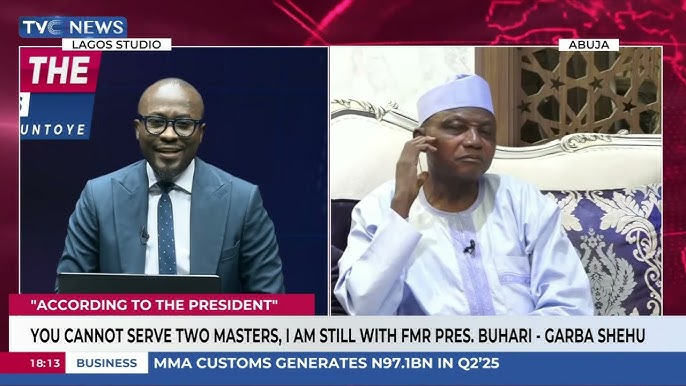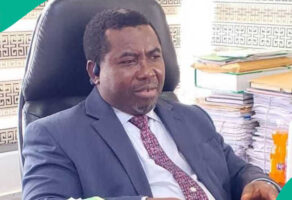What began as a book launch quickly morphed into a political showdown last night as former presidential spokesperson, Garba Shehu, presented his much-anticipated memoir, According to the President, in Abuja.
The event, which drew an impressive lineup of Nigeria’s most influential political figures—including former President Muhammadu Buhari and former Vice President Atiku Abubakar—was more than a literary affair. It became a symbol of political power, influence, and legacy.
As expected, the unveiling of the book—which chronicles Shehu’s two decades at the heart of Nigeria’s political communications—sparked wide interest. However, controversy erupted early in the evening, overshadowing the initial celebration.
Former Secretary to the Government of the Federation, Boss Mustapha, triggered a heated debate when he claimed that President Buhari had already secured a strong electoral base, reportedly “over 12 million votes,” before the formation of the All Progressives Congress (APC). He suggested that the merger merely added about 3.2 million votes to Buhari’s tally, a comment that many interpreted as diminishing the role of President Bola Tinubu in Buhari’s historic 2015 victory.
Political analysts and Tinubu’s allies were quick to push back, accusing Mustapha of attempting to revise political history and downplay the crucial role Tinubu and the APC coalition played in dislodging the People’s Democratic Party (PDP) from power after 16 years.
Speaking on Beyond The Headlines with Nifemi Oguntoye on Thursday evening, Garba Shehu defended the integrity of the event and called out what he described as sensationalism by some sections of the media.
“People should listen to the entire speech, not just cherry-pick words to suit divisive narratives,” Shehu stated. He stressed that no attempt was made to marginalize anyone’s role in the 2015 elections, emphasizing that history must be viewed in totality, not fragments.
Shehu lamented that the fixation on vote statistics was beginning to distract from the primary purpose of his memoir—offering Nigerians a rare insider’s perspective on governance, media relations, and political communication at the highest levels.
He said the book is intended as a resource for young journalists, political aides, and students of governance, stressing that both the achievements and mistakes of past administrations should be studied for the benefit of future generations.
Shehu also addressed his unique political journey, from serving as media aide to Atiku Abubakar during the Obasanjo era to becoming Buhari’s spokesman. He described his career path not as opportunism, but as a “journey of service,” underscoring his personal belief in serving with integrity, regardless of the political camp.
Read Also

“Politics is dynamic, but loyalty must be deliberate,” he said, while also noting the lessons learned from navigating high-pressure environments in the corridors of power.
When asked about his political future and speculations around 2027, Shehu was non-committal but clear on his principles.
“I serve one master at a time,” he said. “People may speculate, but my commitment remains focused on the present.”
Despite recent political movements by some former Buhari allies, Shehu affirmed that he remains firmly within the APC. “Our loyalty remains with the party that brought us this far,” he added, rejecting suggestions of any imminent political realignment.
In a subtle rebuke to Nigeria’s polarized political discourse, Shehu advised restraint and humility in public conversations.
“Words can easily warp narratives,” he cautioned. “We must listen fully before we judge.”
Ultimately, According to the President seeks to do more than just recount history—it aims to inspire future journalists and public servants to approach power with integrity, clarity, and a commitment to truth.
As Shehu put it in his closing remarks, “This book is both an archive and a guide for the next generation. If it helps preserve memory and shape the future, then it has served its purpose.”
The memoir is already generating buzz across political circles, promising to remain a reference point in Nigeria’s evolving political story.





